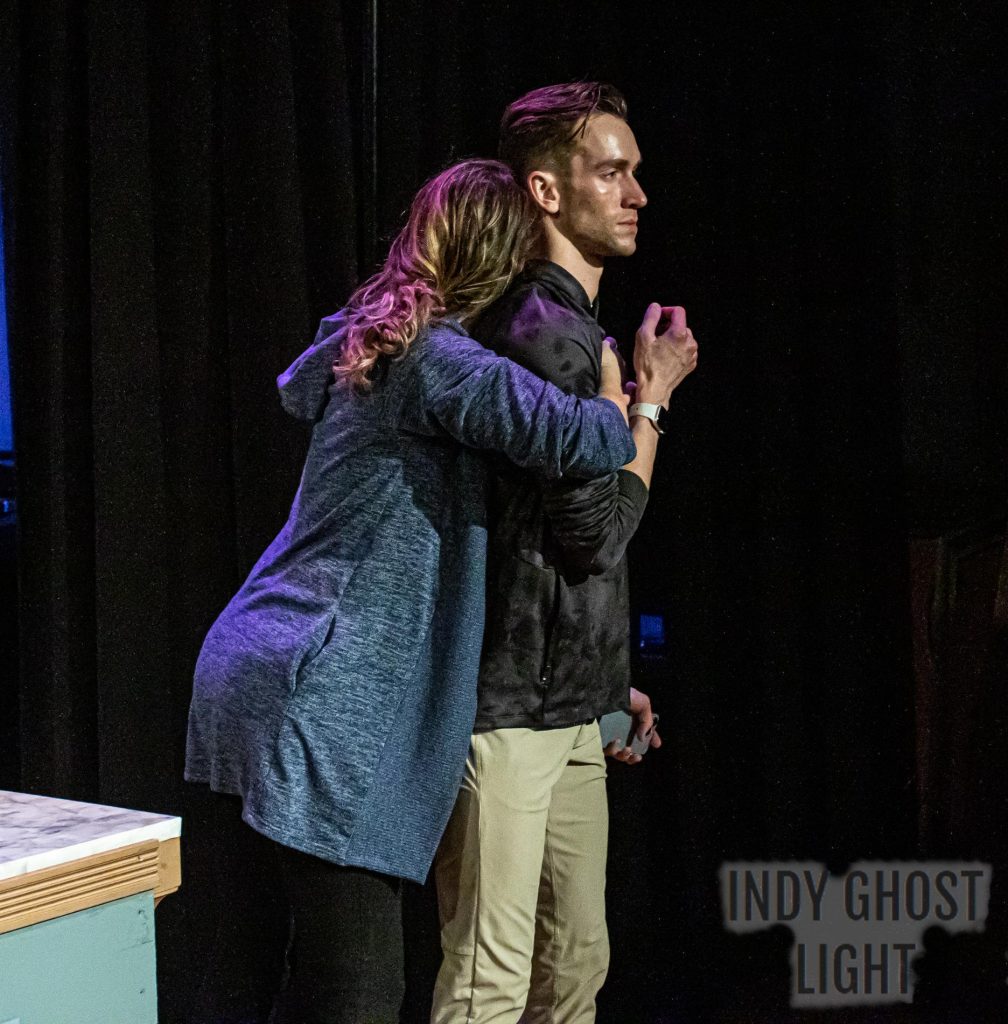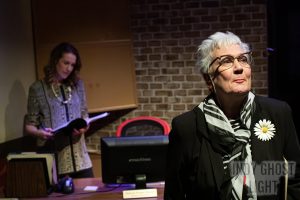
L-R Bridget Haight & Matthew Conwell – Courtesy of Ghost Light Photography. Used with permission.
Following its hit production of “Small Mouth Sounds” in December, American Lives Theatre, spins gold once more this season with “Admissions,” a play by Joshua Harmon. Presented at IndyFringe Basile Theatre right off of Mass Ave in downtown Indianapolis, the play runs through January 30. I attended on Friday’s opening night performance.

Ghost Light Photography
Expertly directed by Chris Saunders, who is also ALT’s founder and artistic director, Harmon’s play opened Off-Broadway at Lincoln Center Theater in 2018. As he did in “Small Mouth Sounds,” Saunders demonstrated his knack for astute casting by assembling a first-rate ensemble that included Matthew Conwell (Charlie), Suzanne Fleenor (Roberta), Bridget Haight (Sherrie), Valerie Nowosielski (Ginnie), and Larry Sommers (Bill).
The term “bleeding-heart liberals” was coined by a right-leaning political writer in the late 1930s and has been used by conservatives ever since to insult and mock the left, particularly regarding their perceived hypocrisy. It’s the false virtue right wingers feel is inherent in liberal politics, as well as the power and privilege, that is called out in Harmon’s often-delicious satire. Although it doesn’t answer as much as it asks about hypocrisy in American politics, there is no question the play is thought-provoking and elicits self-examination once its themes exploring race and class have been absorbed.
Harmon’s very funny comedy centers on the main character Sherrie Rosen Mason, dean of admissions at Hillcrest, a tony, progressive New Hampshire prep school. She’s a white liberal, who’s determined to increase her non-white student body from 18 to 20 percent. It’s a professional goal she and her school-president husband, Bill, are determined to meet, but ultimately, a means of fulfilling their privileged roles as white saviors. In the meantime, things go awry when their star-student son Charlie applies to Yale but is deferred. When he discovers his mixed-race best friend, Perry, has been accepted, the politically correct liberalism that has defined the entire family suddenly goes up in smoke and their true colors emerge. It’s at this juncture Harmon’s basic premise, that well-to-do white people are often eager to preach diversity until the point it affects them, is revealed.

L-R Bridget Haight & Suzanne Fleener – Courtesy of Ghost Light Photography. Used with permission.
As far as the cast, Haight, who impressed me in Summit Performance’s “Mary Jane” turns in another strong performance as the anguished mother torn between her love and ambition and her son and her do-gooder sensibilities. Haight also deserves props for all the food prepping she executes effortlessly while delivering dialogue.
Fleenor, a well-respected actor-director, who has been a fixture on Indy stage for years, offered comic relief with her colorful characterization of Roberta, an “old school” development staff person, assigned to create an administrations catalogue that reflects the school’s inclusiveness,
Conwell displayed his considerable acting chops as Charlie, especially during an angry, and at times unhinged monologue, in which his despondent character rails passionately against affirmative action and the quota system he believes are keeping him from his dream of attending Yale.
Nowosielski was solid in her role as Sherrie’s friend, up until the time her son Perry is accepted into Yale, at which point their close relationship is tested.
Sommers was convincing, as well, in his characterization of a husband and father, who is forced to come to terms with his role in systemic politics and his own self-interests.
The only drawback I saw to “Admissions” was the absence of any characters of color in the script, other than the mention of Perry and his biracial dad, who are offstage. It’s an ironic omission that serves to only reinforce Harmon’s entire thesis about lack of inclusion, but then again, perhaps that was intentional.

L-R Larry Somers, Matthew Conwell & Bridget Haight – Courtesy of Ghost Light Photography. Used with permission.
As far as the show’s production values, I applaud ATL’s efforts at making the most of the limited playing area on the Basile stage. And though specific credit was not listed in the show’s digital program, the show’s set, which included a kitchen area and office, was both well designed and constructed, with both featuring just the right props. Adding to the quality of the show’s production elements was Jeffery Dalstrom’s lighting design and Anthony James Sirk’s costumes
The only drawback I saw to “Admissions” was the absence of any characters of color in the script, other than the mention of Perry and his biracial dad, who are offstage. It’s an ironic omission that serves to only reinforce Harmon’s entire thesis about lack of inclusion, but then again, perhaps that was intentional.





